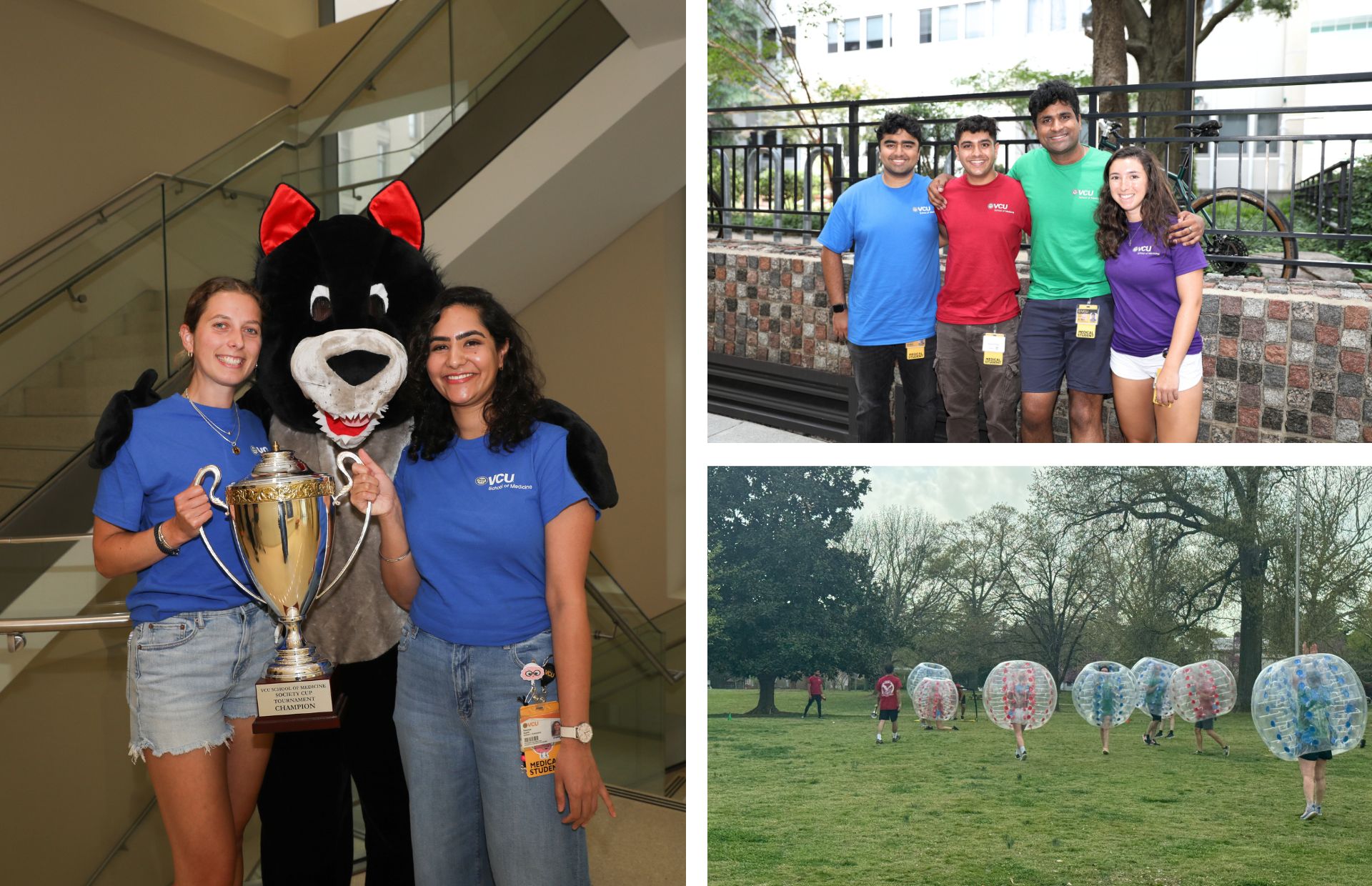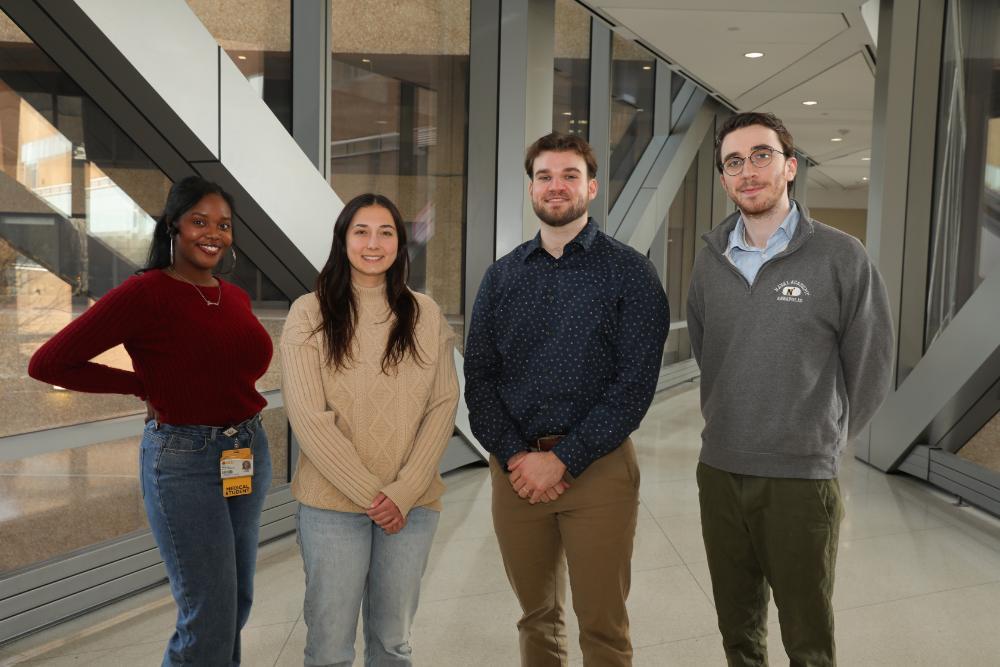'A great foundation:’ Societies system encourages wellbeing beyond the classroom
Through a randomized grouping system, School of Medicine students find friendship and faculty support.

Medical students earn points by completing wellness, service and education related activities, culminating in the Society Cup event in April (Photo collage by Arda Athman, School of Medicine)
Moving to Richmond for medical school last year was the first time Lauren Leung had ever lived outside of California. She didn’t know anyone in the city, and said she felt a little intimidated when it came to making friends.
But she had done her research, and before arriving at the MCV Campus, she knew that the School of Medicine has a solution to that: the societies system. It splits the nearly 200 M1s into four smaller groups named after regions of Virginia — Appalachian Plateau, Blue Ridge, Piedmont and Tidewater — to make meeting others less overwhelming, promote teamwork and establish community, especially during the first two years of medical school.
“Breaking us into groups really helped, especially for students like me who aren’t familiar with the area or don’t know anyone,” Leung said. “It was nice to come in knowing that was going to be there.”
By the end of her first year, she knew the names of at least 50 of her classmates. Leung’s experience with the Appalachian Plateau society was so impactful that now she serves as vice president of societies. She acts as a liaison between the societies’ student leaders and the student government, organizes events and helps her peers connect with one another and with faculty.
“It’s a great foundation to have that provides a lot of support throughout the rest of medical school,” Leung said. “It takes a lot of the burden off us to find these groups and support on our own.”
Layers of support
M1s receive their society assignments during new student orientation. When the semester starts, they are grouped with their fellow society members for courses like Practice of Clinical Medicine, an 18-month course covering basic clinical skills, and anatomy, a second-semester class that Leung said many students find daunting.
"Anatomy is intense. You’re working with a cadaver, which most of us have never seen before, and having to memorize all these terms,” Leung said. “Going into it with a team of people that I'm familiar and work well with really helped.”
Each society determines its own structure and schedule, but M2s widely serve as mentors to first-year members, with four M2s functioning as co-leaders for each group. The leaders are responsible for organizing extracurricular get-togethers, like post-exam ice cream socials, trivia nights and volunteer opportunities. Societies earn points for each event they hold, which culminates in an end-of-the-year field day known as the Society Cup. Students and faculty gather at a local park to compete in activities like pickleball, kickball and relay races, and the champions earn claim to a trophy on display in the Office of Medical Education and bragging rights for the next year. The friendly competition is designed to encourage students to prioritize their well-being outside of the rigors of medical school.
“Having an incentive to step away from your desk and take time for yourself really helps,” Leung said. “It can be easy to get bogged down in everything there is to study.”
One of Leung’s favorite Appalachian Plateau get-togethers is the annual holiday party hosted by Fidelma Rigby, M.D., where society members across all four classes connect and celebrate with ugly sweaters and cookies, then go home with matching ornaments from Rigby. A professor in the Department of OB-GYN, Rigby serves as a society champion, an informal advisory role that provides additional support for her society members.
Rigby said she intends to be a “faculty cheerleader” for her students, encouraging them through their medical school journey and fostering community outside of the classroom setting.
“I always like to create a sense of camaraderie,” Rigby said. “It's a way for them to see their peers and faculty outside of the classroom in a fun, family-like setting.”
Students begin to splinter off from their society groups as they progress through medical school and their tracks become more individualized based on their interests, but often reunite at events like Rigby’s holiday party. Leung believes the connections students form as M1s are strong enough to persist through hectic clinical schedules.
“We go through so much together. These are some of the very first people you meet at medical school,” Leung said. “I think it’s a really good system for encouraging lasting friendships.”
Expanding resources
This year, the Office of Medical Education, which oversees the societies system, has increased faculty involvement to provide dimensions of support for students. This includes the integration of Project HEART, a program of small group sessions where students can discuss the personal and academic challenges of medical school.
This academic year, two faculty that already served as Project HEART leaders will now also serve as formal co-leaders of each society. Michael Jones, M.D., an assistant professor in the Department of Emergency Medicine and Project HEART leader, said he is excited to join the Tidewater society and provide support for his members.
“I think it’s common to feel overwhelmed or discouraged,” Jones said of medical students. “I want to help students foster and develop their ability to take care of themselves, and eventually their patients, that results in a rewarding medical school and career experience.”
Both Jones and Rigby noted that they did not have a structure like the society system when they were in medical school. As a result, they said that in their experience, students and faculty often felt more separated from each other, and it was on the students to find someone they were comfortable confiding in.
“That is a hurdle that can be hard to overcome,” Jones said. “Societies take the pressure off of students to find their own faculty support and provide students with a resource that they know they can always count on."
Send us your stories!
The School of Medicine communications team is always looking to highlight student success, faculty achievement, cutting-edge research and innovative initiatives around the MCV Campus. If you have an idea for a story, please submit your pitch to laura.ingles@vcuhealth.org.
